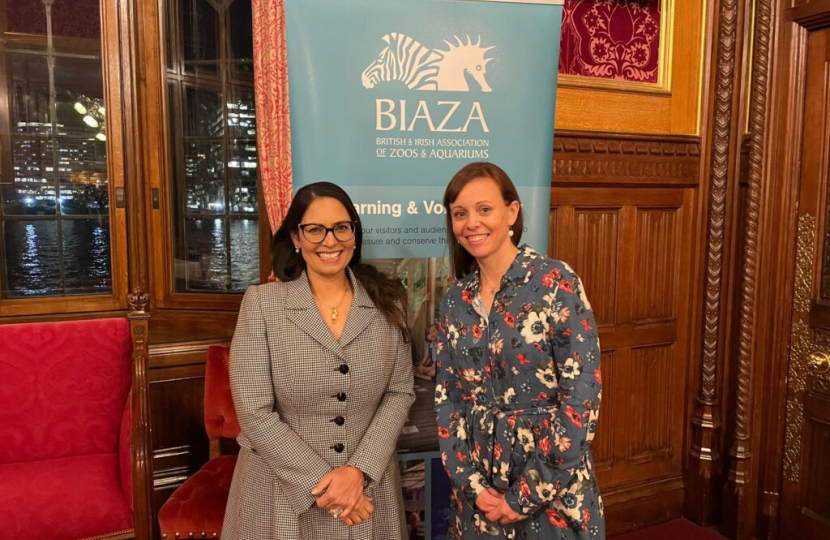
Local MP Priti Patel met with the Director of Colchester Zoo during the BIAZA Parliamentary Reception hosted by the Speaker of the House of Commons. Colchester Zoo was shortlisted for the British and Irish Association of Zoos and Aquaria (BIAZA) Great British Wildlife Restoration project. While the zoo did not win for their brilliant conservation work to support the Fisher’s Estuarine Moth, they have transformed the life chances of this endangered native species. This moth is a British species of high conservation priority, listed in the Red Data Book as a protected species. The moth is completely reliant on a plant called Hog’s Fennel as its sole larval/caterpillar food plant; a plant species which itself is also threatened. It also requires long, coarse grass species to fulfil its egg-laying requirements. In the UK, Hog’s Fennel is limited to two main localities; along the north Essex coast and the north Kent coast.
In an off-show location at Colchester Zoo, breeding cages were established, each holding a Hog’s fennel plant and grass species for the adult females to lay their eggs. When the adult moths emerge in September and October, Colchester Zoo’s keepers mix unrelated pairs for mating and the resulting eggs are subsequently used for the following year’s captive breeding programme, with any additional eggs released into the newly created sites.
Monitoring surveys have shown that 32 of the 33 habitat sites have signs of the caterpillars feeding or of adult moths; some of these have been populated by the breeding programme, but many colonised by the moth as it now spreads across its new range.
Due to the population expansion and colonisation of sites, the zoo captive breeding element of the programme is now being paused. This doesn’t mean it will stop permanently, as hopefully new sites will come on board, and eggs will be needed to populate these sites in future. The zoo team will therefore continue to maintain the off-show area and grow on plants for future use once additional new sites are created. The zoo team will also continue to conduct monitoring surveys of larval feeding and adult moth sightings at various locations.
Priti said: “I was delighted to join Rebecca Moore, Director of Colchester Zoo, at the Parliamentary reception hosted by the Speaker. Together they are leading on vital conservation work in Essex, the UK and across the world.”
Rebecca Moore said: “This programme is a great achievement for all involved at Colchester Zoo and we are delighted to play a role in contributing towards the conservation success of this programme so far alongside other stakeholders; the Essex Wildlife Trust, Environment Agency, Butterfly Conservation, Tendring District Council and Natural England.”




